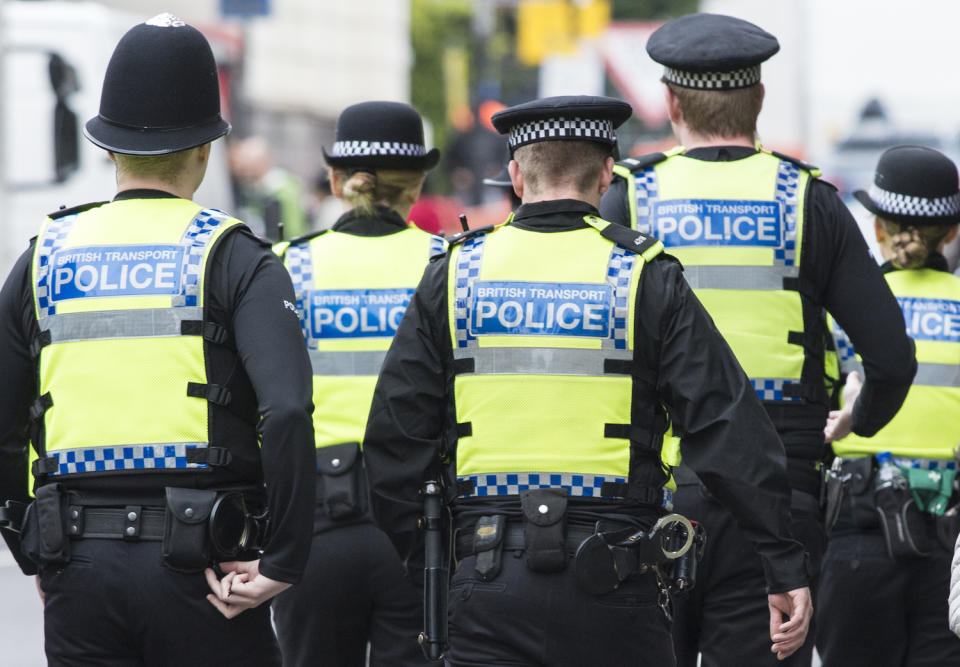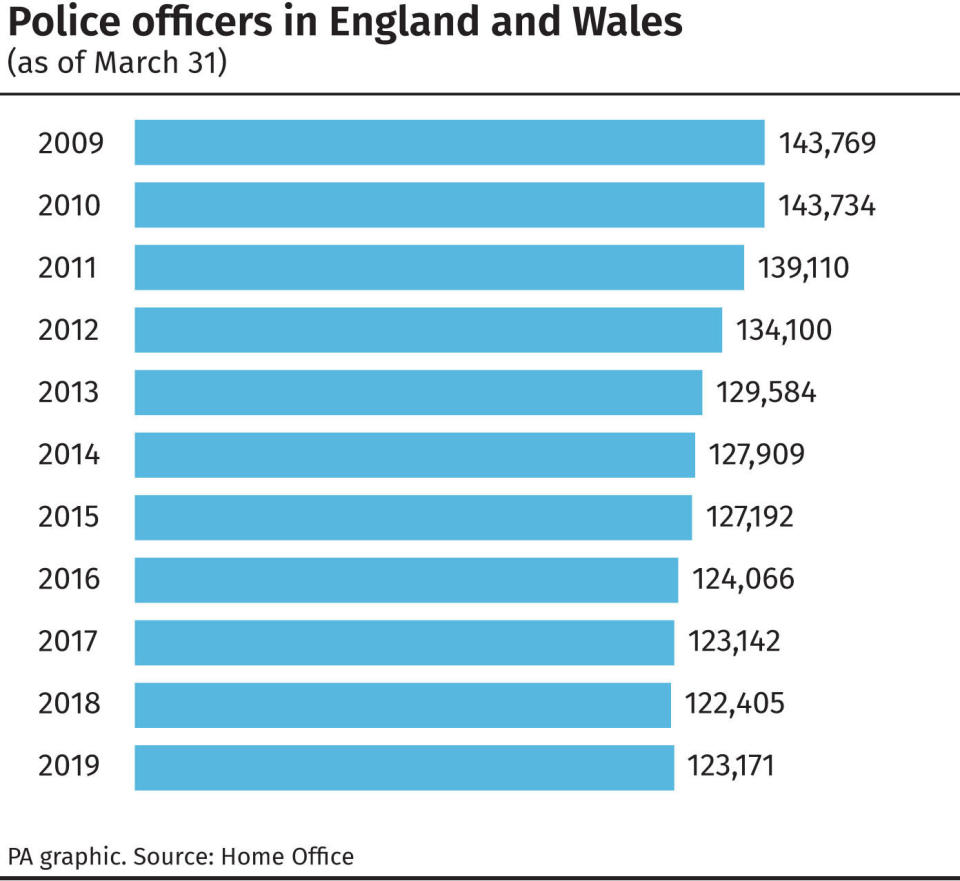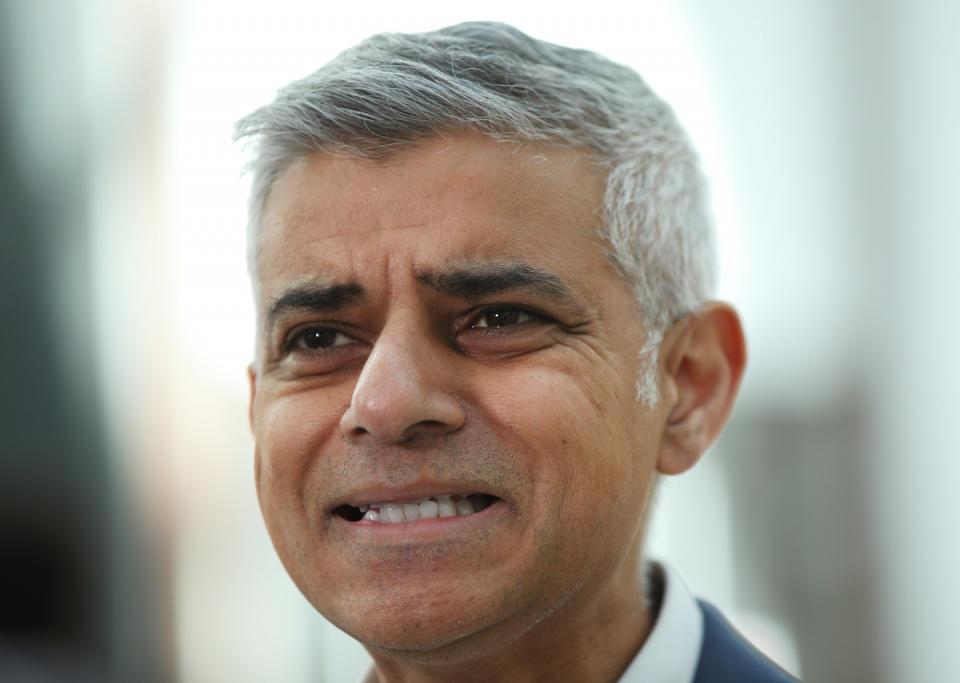Can Johnson cut crime? Why new PM's '20,000 police' pledge may not be effective

Boris Johnson has promised to tackle crime head-on as prime minister.
During his campaign, he pledged to put 20,000 more police officers on the streets of Britain, at a cost of £1.1 billion, a pledge he reiterated during his speech outside Number 10 shortly after becoming PM on Wednesday.
He wants to increase police numbers to more than 140,000 by 2022.
Police numbers have dropped from 144,353 to 122,395 in the past 10 years, according to Home Office figures.
He says the increase in numbers will focus on rural areas that have seen the biggest reduction in police funding in recent years.
However, Mr Johnson’s pledges to combat crime have come under scrutiny, as have his claims about his past record as mayor of London.
Mr Johnson said the money to fund extra officers would be taken from a £26 billion “headroom” reserves set aside by chancellor Philip Hammond.
“What we are saying is that we are going to use some of the existing headroom, quite a small amount, about £1.1 billion, to put more police officers out on the street and I think that is what the public want,” said Mr Johnson.

“We are still well within the £26 billion that the chancellor squirrelled away quite prudently, the money is going on education, a little bit on broadband – and that is already allocated – and on policing as well.”
But Mr Hammond has made repeated warnings that the £26 billion would not be available for campaign pledges in the event of a no-deal Brexit.
Should Britain leave the EU without a deal at the end of October, as Mr Johnson vowed in his major leadership campaign promise, then the reserve funding would be allocated to the aftermath of the withdrawal, Mr Hammond insisted.
BORIS JOHNSON IN NUMBER 10: MORE FROM YAHOO UK
Johnson is a 'mini-Trump' who will be a disaster, warn Euro newspapers
Boris Johnson: ‘can-do spirit’ can solve problem of Irish border
Michael Gove: Why I’ve changed my mind about Boris Johnson
Boris Johnson says ‘three years under Theresa May will seem like a bad dream’ once he’s Prime Minister
Boris Johnson profile: Eccentric, unmissable... and now the man in the top job
But even if Britain does leave with a deal and the money is available, there are doubts if Mr Johnson’s plan is the best way to spend it.
Sir Thomas Winsor, the chief inspector of constabulary, said boosting police numbers by 20,000 in three years may not be the best way to use the funds.
While he welcomed Mr Johnson’s pledge, he said: “It’s certainly simple but it may not be the most effective way of spending on policing.

“I’m not for a moment saying we don’t need more cops and police staff. I’m sure Boris Johnson doesn’t expect people to believe there will be 20,000 police officers on the streets by Christmas.”
Sir Thomas said the £1.1 billion would only cover the cost of hiring the officers.
“You can’t recruit them all that quickly and they take 18 months to two years to train,” he said.
“You have to invest to be more efficient and that will cost more money. Not all of that money should be spent on hiring people. Some of that money should be spent on technology.”


Mr Johnson’s claims about tackling crime in the past have also been questioned.
During the Tory leadership campaign, he said that crime fell by 20% during his time as mayor of London between 2008 and 2016, and that the murder rate dropped by 50%.
Mr Johnson also claimed a rise in stop-and-search operations by police, which he wants to increase as prime minister, had contributed to reducing crime.
While Mr Johnson’s claim that crime fell by 20% during his time as London mayor is largely true, it fell by 26% across England and Wales in the same period, according to BBC Reality Check.
Boris Johnson says crime fell 20% while he was London mayor - which is true, but it fell 26% in the whole of England and Wales during that time #bbcournextpm
— BBC Reality Check (@BBCRealityCheck) July 12, 2019
The murder rate in the capital did fall while Mr Johnson was mayor, according to independent charity Full Fact, from 163 homicides the year he took the job to 94 in 2014 - a drop of almost half from a rate of 21 homicides per million to 12 per million.
But by his last year in office, 2016, the rate had crept up to 13 per million, or 109 homicides.
Abbas Panjwani at Full Fact said: “Mr Johnson could increase the police budget, but the UK's public finances are already in deficit. To spend more on the police, Mr Johnson would either have to cut other areas of public spending, increase tax revenues, or borrow more money.
“It's correct that crime was around 20% lower when Mr Johnson's mayoral term ended than when it started. But the data should be taken with a pinch of salt for a few reasons.
“In 2007/08, the year before Mr Johnson became mayor, there were around 850,000 recorded crimes in London, or 110 per 1,000 residents. In his final year as mayor, this had decreased to about 740,000 or 85 per 1,000 residents, a drop of 23% over the period.
“But changes in this police recorded crime data can reflect changes in how the police record crime, not just changes in the total level of crime. Also, fraud and unrecorded crimes are not captured in this data.

“It’s worth noting it didn't fall every year - it increased in the year to March 2016, his last year in office.
“It's worth noting that the trends in London broadly reflected the trend in the rest of England and Wales - generally falling from roughly the mid-2000s onwards, then generally starting to rise again around the mid 2010s.”
And Mr Johnson’s claim about the impact of stop-and-search is contradicted in a Home Office report in 2016 which said the practice brought “no discernible crime-reducing effects”.
There were 135 killings in London in 2018 - 76 of which were fatal stabbings. This year there have been at least 35 fatal stabbings.
The city’s current mayor, Labour’s Sadiq Khan, says the knife killings are the “human cost of austerity”, claiming £800 million had been “stripped” from the Metropolitan Police budget since 2010.
Mr Khan urged the next prime minister to reverse police cuts.


